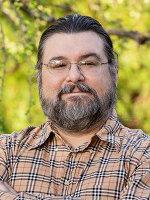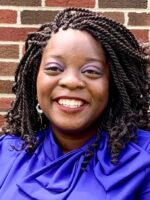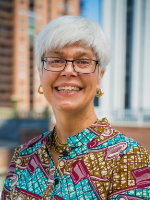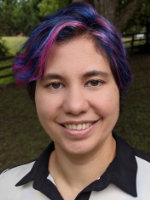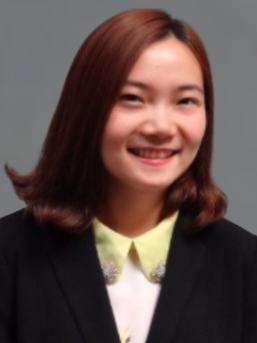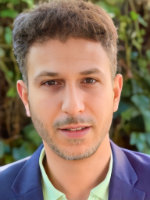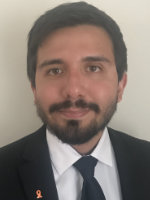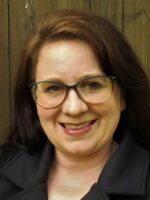Osa Maiyanne Adaján, Ph.D.
President
“I am passionate about helping others become better at what they do. There are so many amazing organizations creating tangible change in our world. Providing the highest-quality thought partnership with unmatched excellence in service to clients and partners is my first priority.”
—Osa Maiyanne Adaján, Ph.D.
Dr. Osa Maiyanne Adaján is the Co-Founder and President of Creative Research Solutions. Dr. Adaján brings a unique approach to her work in research and evaluation, including a personal touch, a bit of humor, and genuine concern for the well-being of her team and CRS’ clients and partners. As a local, national and international award-winning evaluator, facilitator, and thought leader, she strategizes with organizations to improve their programmatic design, grantmaking strategy, program implementation, strategies for systems-level change, and community partnerships. Her results-driven approach measures and documents her clients’ impact, maximizes client resources, and enables them to tap into new markets. Dr. Adaján is a skilled and sensitive facilitator and trainer, certified in Results-Based Accountability (RBA). She has used the RBA framework to help nonprofits, educational institutions, government agencies, foundations, and the communities that they serve co-create collaborative, shared evaluation outcomes.
Dr. Adaján is a trusted advisor to several national and international initiatives in the domains of education, health, human rights, philanthropy, community engagement, and political advocacy. Her insights and strategic oversight have enabled local, national and international organizations to refine and scale their programs, tackle roadblocks and barriers, and authentically engage key partners in lasting change. While many of the initiatives that she supports are confidential, a few include serving as an advisor to the White House, the Annie E. Casey Foundation, the Krupp Family Foundation, The John D. and Catherine T. MacArthur Foundation, the W. K. Kellogg Foundation, The Duke Endowment, ProGeorgia, and Reboot Representation, a regrantor for a coalition of global technology companies.
She has also served as an advisor and collaborator for a rigorous strategy review of a multi-year, global grantmaking portfolio in the area of human rights. Dr. Adaján previously served as the Project Lead on an international STEAM curriculum development project for middle school girls of color and as the Lead Evaluator on the United Nations Foundation’s Retrospective Impact Evaluation of their Girl Up Campaign. She evaluated the five-year outcomes of this international campaign that raised $7.2 million for UN programs with more than 2,000 global partners and affiliates in health, education, and civic engagement. These programs help girls in developing countries have the opportunity to see a doctor, attend school, and stay protected from violence.
Dr. Adaján is trained in a variety of research methods and is also a skilled and sensitive facilitator. As a facilitator and evaluator for the United Way of Greater Atlanta (UWGA), Dr. Adaján co-facilitated a series of ongoing training workshops with hundreds of UWGA grantees and prospective partners to develop a new, shared framework for improving child well-being in the Greater Atlanta area. She then worked with UWGA staff, grantees, and community members to create shared action plans and evaluation frameworks for addressing racial, gender, and socioeconomic disparities at the child, family, and community levels in the state of Georgia for each of the 14 strategies of the Child Well-Being Index. Her consultancy also provided key strategy and program development insights that helped Spelman College secure a 5-year, $2.7-million grant from the U.S. Department of Education to test a metacognitive curriculum intervention, for which she served as Lead Evaluator. This project was considered for the highly-rigorous national registry in education, What Works Clearinghouse. In addition, Dr. Adaján worked with the DeKalb County Office of Youth Services to assess the impact of six youth programs, each with a health or education focus.
Dr. Adaján has been fortunate to receive several prestigious national and international fellowships and has served as Arts of Citizenship Fellow; the Institute for Research on Women and Gender (IRWG) Fellow; National Endowment for the Humanities (NEH) Fellow; and U.S. Department of Education Fulbright-Hays Fellow (Brazil). Dr. Adaján has won national and international awards for her work, including a National Association for Women-Owned Businesses Shining Star Award. She also received an international honor, the Rising Star Award from the International Journal of Ethnic College Health for her work with the Life Balance and Wellness Institute in addressing health disparities among youth and college students of color. She previously served on the Board of Directors for the DeKalb Chamber of Commerce (GA).She earned her Ph.D. from the University of Michigan in American Studies and her Bachelor’s Degree from UC Berkeley (Interdisciplinary Studies and English), summa cum laude. She served as Program Co-Chair for the American Evaluation Association’s Nonprofits and Foundations Topical Interest Group (AEA NPFTIG), and has also held visiting professor and visiting scholar appointments at several colleges and universities. An invited radio and television guest and featured writer at news and media outlets, Dr. Adaján is the author of several print and media publications in the fields of educational and community research, evaluation, and self-care. Her previously published work may be found under the name “Dr. Shanesha Brooks-Tatum”.
Ajíšafé Adaján, Ph.D.
Executive Vice President
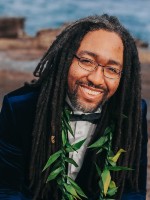
“My vision is to help individuals, institutions, and communities reach their highest potential. It is my honor to serve communities through rigorous research and evaluation that is culturally responsive, equitable, and adaptable.”
—Ajíšafé Adaján, Ph.D.
As Co-Founder and Executive Vice President of Creative Research Solutions, Dr. Ajíšafé Adaján is dedicated to helping individuals, institutions, and communities improve their performance through high-quality research and deliverables. Dr. Adajan’s leadership has helped the firm become one of the most trusted in the evaluation sector. Dr. Adaján has led CRS in over 13 years of award-winning, impactful work. He and his team help organizations nationally and globally measure and document their outcomes and community impact as they work to address structural inequities. The work of Dr. Adaján and his staff has positively impacted communities in the United States, South Africa, India, Mexico, Haiti, Brazil, Uruguay, and several other countries.
For the past 5 years, he has collaborated with Griffin and Strong, P.C., to provide leadership and strategic oversight for a team of national researchers specializing in completing disparity studies at the city, county, and state levels. Disparity studies are some of the most rigorous research projects as the research design and analyses must withstand legal scrutiny. In addition, Dr. Adaján exhibits a highly specialized skill in creating dashboards, predictive models, and other data science tools to ensure the success of projects and initiatives. He uses data- and research-informed approaches to help organizations predict outcomes. With his unique combination of academic preparation, research training, infotech integration, and communication skills, Dr. Adaján and the CRS team are able to provide outstanding value to your organization.
Dr. Adaján earned his Ph.D. in Social Psychology at the University of Michigan and currently resides in Atlanta metro area. As a social psychologist, Dr. Adaján is skilled in finding ways to measure seemingly “unmeasurable” outcomes. For example, his co-authored article in Group Processes and Intergroup Relations, “Teachers and Learners: Roles Adopted in Interracial Discussions,” examined the extent to which White and Black discussion participants felt that they were in “teacher” and “learner” roles while talking about race. Likewise, Dr. Adaján’s previous work, Directed Attention and Stereotype Threat in Interracial Interactions examined White participants’ experience of stereotype threat in the context of talking about race. Each of these projects demonstrated Dr. Adaján’s ability to effectively measure social outcomes even when dealing with challenging issues or situations.
In addition to his academic experience, he has also developed strong facilitation skills through the CommonGround program at the University of Michigan. Facilitation differs from other communication skills in that it focuses on helping others bring forward their ideas to the benefit of the group, especially where either situational factors or individual differences in communication style might otherwise interfere with communication. When applied to interviews and focus groups, Dr. Adaján’s ability to thoughtfully engage with participants will greatly enhance the depth and quality of the data collected.
Dr. Adaján has previously served as President of the Atlanta-Area Evaluation Association. Dr. Adaján’s previously published work may be found under the name “Dr. Travis Tatum”.
Jeremiah-Alec R. Piña, Ph.D.
Director of Research and Evaluation
Jeremiah Piña, Ph.D., is Director of Research and Evaluation at Creative Research Solutions. For more than a decade, his work has focused on advancing opportunities for historically underrepresented and marginalized young people to engage with, and find success in, STEM learning. His experience with STEM education crosscuts areas of curriculum development, teacher professional development, and outcome assessment. He is a strong proponent of utilizing methods of teaching, learning, and assessment that leverage aspects of divergent thinking, creative problem-solving, narrative learning (especially culturally-based narratives), and the use of imagination.
Dr. Piña earned his Ph.D. in Educational Psychology at the University of Georgia. His initial academic areas of study focused on the assessment of creative thinking skills and the psychosocial development of creative performance during adolescence. His dissertation centered on creating new methods of assessment that could capture the role of adolescent identity transitions and their consequences on the creative performances of self-identified “nerdy” or “geeky” middle schoolers who faced social marginalization and bullying.
His passion for working with underrepresented and marginalized students in STEM education was ignited when he began to engage with upper elementary and middle school students from disadvantaged backgrounds during his research assistantship with the Center for Latino Achievement and Success in Education (CLASE) and, later, as an assistant for the Project for University-School Partnership for Achievement, Rigor, and Creativity (Project U-SPARC). This has continued in his more recent work with the Transforming Engineering Education for Middle Schools (TEEMS) project, wherein the team sought to create a novel framework for narrative-based instruction as a means of scaffolding the learning of key engineering design concepts for students from historically underrepresented backgrounds.
As an ongoing aspect of his work, Dr. Piña has been an advocate for integrating assessments into the classroom learning environment in such a way that they can both provide useful information for educators and enhance the engagement of learners. To this end, he has worked to develop multiple assessment tools for use in STEM classrooms, most especially at the upper elementary and early middle school levels. These measures were designed to capture difficult-to-assess indicators of student learning outcomes such as cognitive engagement, concept-based problem-solving, reflection, and the development of creative thinking skills. Assessments Dr. Piña has developed include (1) a scenario-centered performance-based assessment of engineering design process knowledge, (2) a short form of the engineering identity and self-efficacy assessment, (3) a self-report assessment of adolescent geek identity transitions in early middle school, and (4) the baseline measure of the achievement, rigor, and creativity self-efficiency questionnaire.
Dr. Piña continues to pursue his academic passion for working with topics in creativity development, as well. His most recent publications include four chapters for the Encyclopedia of Creativity covering topics as diverse as eccentricity, paracosms (persistent worlds of fantasy play), geek identity development, and a historical discussion of the creativity of games and gaming.
He has also more recently served as a freelance assessment and evaluation consultant for educational programs designed for implementation in K-12 educational settings, as well as programs designed for informal learning settings. In his role as an active, responsive collaborator and thought partner, Dr. Piña works to highlight issues of equity, diversity, and inclusion and provide a means, through the application of strengths-based assessment and skills development, to aid teachers and students to realize meaningful and consequential learning outcomes.
Dr. Piña is a member of the Nomlaki tribe, which is one of the constituent tribes of the Round Valley Indian Tribes. He currently lives in Georgia. He loves to cook and is an avid pen-and-paper roleplaying enthusiast.
Keyondra Brooks, Ph.D.
Assistant Director of Research and Evaluation
Keyondra Brooks, Ph.D., is Assistant Director of Research and Evaluation at Creative Research Solutions (CRS). As an evaluator, she aims to conduct ethical, community-driven mixed methods research that promotes citizen empowerment. Keyondra is particularly passionate about addressing social determinates for wellbeing among LGBTQIA+ and ethnic minority populations. She considers herself a lifelong learner dedicated gaining the skills and experiences necessary to help the communities she serves. She has experience working with organizations in the areas of juvenile justice, integrated health, and financial literacy. In addition, she has experience with board development, report writing, and strategic planning with various organizations.
Keyondra obtained her Master’s in Clinical-Counseling Psychology from Valdosta State University. In this program, she received training in research methods, treatment planning, adult and child psychopathology, and intellectual and personality assessment. As a practicum intern, she worked as a trauma-focused therapist completing individual and group counseling with adolescents at the Children’s Advocacy Center of Lowndes County. Following, she earned her Ph.D. in Community Psychology from Wichita State University in Wichita, Kansas. As part of this curriculum, she received instruction in qualitative and quantitative data analysis, grant writing, prevention, and leadership. During her Ph.D. practicum, she helped complete a mixed-methods process evaluation regarding the integrated health model at a federally qualified health center. As a student, she worked with a research team to complete a mixed methods needs and assets assessment observing racial disparities in juvenile justice involvement in Sedgwick County, Kansas. She also aided with a financial literacy assessment for Wichita State University students and assisted with board development and strategic planning sessions Storytime Village and The Wichita African American Council of Elders. She has presented at the Association of Black Psychologists, Midwestern Psychological Association, and Society for Community Research and Action conferences. Throughout these projects, she helped develop and execute focus groups and interviews, surveys, data analysis, literature reviews, and final reports for community organizations.
She also completed several research projects during her studies. She completed a second-year project which observed the intersection between Black identity and future goals of middle school-aged male youth. For her dissertation, she investigated LGBTQIA+ individuals’ experiences with religion and suicidality. She was also included in a research publication about perceived stress and college students and worked as a student consultant for Midwest Evaluation and Research. Throughout her academic career, Keyondra instructed courses in leadership, college success, fieldwork in community psychology, psychology of learning, and psychology of women. She has a passion for expanding theoretical concepts within the discipline of psychology to everyday problems and making psychology and community psychology accessible to students and communities. In 2020, she received a departmental award for community psychology student of the year and was also the Michael P. Tilford Graduate Fellowship recipient. Keyondra is currently a member of the Society for Community Research and Action.
Lauren Saenz, Ph.D.
Senior Evaluation Associate II
Dr. Lauren Saenz, PhD, is Senior Evaluation Associate II at Creative Research Solutions. She is an evaluator, researcher and methodologist with fifteen years of experience in the field of educational evaluation and a long record of collaborating with K-12 and higher education professionals, nonprofit and public organizations, and individuals to meet a diverse set of evaluation and research needs. She is committed to doing work that makes schools and schooling more equitable, more compassionate, more connected to the world, and more meaningful and stimulating and just for teachers and kids and families and communities. Throughout her career, she has collaborated with local, state, and national organizations to provide evaluation and research from strategic planning and design, to logic model and instrument development, to data analysis and presentation.
Dr. Saenz received her undergraduate degree from Princeton University, with a focus on English Literature, and her PhD in Educational Foundations, Policy, and Practice from the University of Colorado at Boulder. Her early work in the field of education focused on the impacts of race-conscious education policies. Prior to joining CRS, she worked as an evaluation associate at the Institute for Schools and Society at Temple University, where she led and managed as co-principal investigator on multiple federally funded research and evaluation projects, including large-scale longitudinal studies with multiple school districts in the areas of teacher compensation and evaluation and 21st century skills-based school leadership development. In subsequent roles, she designed and conducted evaluation and research projects exploring a wide range of issues and topics in education, including citizen science investigations, special education service programs, and career and technical education. Dr. Saenz was also previously a faculty member in the Measurement, Evaluation, and Statistical Analysis graduate department in the Lynch School of Education at Boston College and the Education Department at Bowdoin College, where she taught courses in evaluation and research design and education philosophy and policy, and supervised research and evaluation projects in multiple capacities.
Dr. Saenz has presented work at numerous national and international conferences, including the American Educational Research Association, the Philosophy of Education Society, and the American Evaluation Association. She is the author and co-author of several peer-reviewed articles and book chapters, which include publications in the Harvard Educational Review, the American Journal of Education, and the Journal of Childhood, Education, and Society. Her published work spans empirical and theoretical research in evaluation theory, educational philosophy, race-conscious education policy, and instrument development. She is also the co-creator of the SciEPOP app, an iOS-based observation tool designed to support research and practice in early science and engineering learning and benchmarked to the Next Generation Science Standards.
Mary Piontek, Ph.D.
Senior Evaluation Associate II
Dr. Mary Piontek has over 35 years of experience conducting research and evaluation in education, health, arts and culture, science, and social service settings. Her research, evaluation, and training experiences include needs assessments and program development, personnel and program evaluation, organizational development and strategic planning, logic model development, educational assessment, learning strategies, standards and curriculum development, case study research, survey research, focus group facilitation, and qualitative and quantitative data analysis.
She has worked with private foundations, arts and culture organizations, institutions of higher education, education and health/human service government agencies, social service and health systems organizations, schools and districts, and community-based organizations and service providers. Her academic training includes natural science, social science, and humanities epistemologies and research methods. She is very familiar with professional accreditation systems, competency-based educational outcomes, and professional standards across a variety of disciplines.
She has served as a research methods and writing coach, co-taught doctoral research seminars, and supported doctoral candidates and their faculty advisors in designing and implementing research and evaluation projects. Dr. Piontek has provided professional development training on a variety of educational pedagogy, assessment, curricular development, research design, and program evaluation topics. She has planned and implemented accreditation and strategic planning processes, as well as designed course evaluation instruments, program assessment tools, surveys and interview/focus group protocols, and curricular review criteria. She has also served on Institutional Research Review Boards at institutions of higher education and private research organizations and acted as a technical advisor on research ethics and standards.
Dr. Piontek has been the principal investigator, lead researcher, and primary evaluator on grants and programs funded by a variety of sources, including the Institute of Education Science, National Institutes of Health, Department of Health and Human Services, National Science Foundation, National Endowment for the Arts, U.S. Department of Education, Centers for Disease Control and Prevention, W.K. Kellogg Foundation, Doris Duke Charitable Foundation, James Irvine Foundation, Denver Foundation, BUILD Health Initiative, Colorado Juvenile Justice and Delinquency Prevention Council, Rocky Mountain PBS, Colorado Department of Public Health and Environment, California Conservation Innovations-Resource Legacy Fund, Math Science Partnership Grant-Purdue School of Education; Research Experiences for Teachers-University of Notre Dame, and numerous federal and state governments and agencies, philanthropic organizations, educational systems, and professional associations.
She holds a BA (University of Michigan) and MA (Western Michigan University) in English Literature and a PhD in Measurement, Research, and Evaluation (Western Michigan University).
Jem Olejarczyk, Ph.D
Data Scientist
Dr. Jem Olejarczyk is a Data Scientist at Creative Research Solutions. As an educator, researcher, program evaluator, and data scientist, she works to foster a more sustainable, just, and equitable world through data-driven decision-making and culturally responsive evaluation. She applies the scientific method to investigate questions, examine trends, and measure impact with statistics. She currently volunteers for Statistics without Borders and Habitat for Humanity to support positive impact for communities in need.
Her work in evaluation began as a research associate and analyst at the Research, Evaluation, and Measurement (REM) Center within the College of Education at the University of South Carolina (UofSC) for two and a half years. As a research associate, Dr. Olejarczyk evaluated outcomes from education intervention programs using both private survey data and public data sources to measure the impact of an intervention. She also educated staff and students on statistical software, statistical methodologies, data visualization, reporting, current review standards in education, and other professional development workshops. She used hierarchical polynomial regression, propensity-score matching, factor analysis, latent profile analysis, and power analysis as part of her work with REM Center.
For over a decade, Dr. Olejarczyk has designed, analyzed, and conducted research within the area of cognitive psychology as a CITI-trained ethical researcher. During that time, she managed research projects, trained staff, and programmed experiments across five labs at three universities: Audition Lab at Northeastern University, Mollylab at Massachusetts Institute of Technology, Visual Cognition Lab at UofSC, Knowledge of Orthographic Learning Lab at UofSC, and Morris Lab at UofSC. She collaborated with undergraduate and graduate student researchers, post-docs, and faculty on research related to attention and memory. Her dissertation examined the effects of memory for a target location during search while monitoring eye movements. Her statistical training included multivariate statistics, item response theory, multilevel modeling, and structural equation modeling. Her cognitive psychology research training included eye-tracking, transcranial direct current stimulation, and functional magnetic resonance imaging.
As an educator for five years, Dr. Olejarczyk has mentored both undergraduate and graduate students during her time at UofSC. She taught courses in Cognitive Psychology as well as Research Methods. She continues to use teaching as a form of activism to promote critical thinking skills and inquisitive learning.
Dr. Olejarczyk earned her Master of Arts and Ph.D. from the University of South Carolina (Experimental Psychology), and her Bachelor of Science degree from Massachusetts Institute of Technology (Biology with a minor in Biomedical Engineering). She has published in the Journal of Family Psychology, Visual Cognition, PLoS ONE, and Journal of Experimental Psychology: Human Perception and Performance. Her previously published work may be found under the name “Jenn Olejarczyk”.
Tina Wang, Ph.D.
Senior Evaluation Associate
Tina Wang, Ph.D. is a Senior Evaluation Associate at Creative Research Solutions (CRS). Dr. Wang has extensive research experience in different areas, including language assessment, educational assessment, and program evaluation related to STEM, public health, and mental health. Dr. Wang is skilled at conducting quantitative and qualitative research through the lens of culturally responsive and equity evaluation and assessment. Dr. Wang received her Doctoral degree in Cultural, Literacy, and Language at the University of Texas at San Antonio (UTSA). She completed her postdoctoral studies at UTSA after graduation. Prior to joining CRS, Dr. Wang worked as a researcher at various research-oriented higher education institutions, including Louisiana State University, University of Kansas, and University of Texas at San Antonio Health and Science Center.
Dr. Wang’s research and evaluation work serves linguistically and culturally diverse populations as well as the marginalized groups, including communities of color, low-income students, refugees, immigrants, learners with significantly cognitive disabilities, non-traditional older adults, bilingual students, and English language learners. Apart from research and program evaluation, Dr. Wang has a great passion for teaching. She received her Master’s degree in Teaching English to Speakers of Other Languages (TESOL) at Michigan State University (MSU) and was an English as a second language instructor for two years at INTO University. She also taught undergraduate and graduate students at the university level.
Dr. Wang has presented in numerous national and international conferences, such as the American Education Research Association (AERA), Language Testing Research Colloquium (LTRC), and Teaching English to Speakers of Other Languages (TESOL). Her first-authored articles were published in peer-reviewed journals including CALICO Journal, International Journal of Computer-Assisted Language Learning and Teaching (IJCALLT), and TESL-EJ. She was awarded two University life awards and three nationally competitive grants, including the Language Learning grant, the Educational Testing Services TOEFL Small Grant, and the National Federation of Modern Language Teachers Associations (NFMLTA) grant. She was also actively involved in various grant proposals and has facilitated her team secure fundings from the National Institute of Health, Najim Family foundation, Rackspace, HighImpact, Foreign Language Teaching and Research Press, and Department of Education, etc. Through Dr. Wang’s work in teaching, research, and evaluation, she strives to improve the equity, diversity, and inclusivity of education.
Zachariah Rabah, MS
Evaluation Associate II
Zachariah Rabah is an Evaluation Associate II at Creative Research Solutions (CRS). As an emerging evaluator, Zachariah has evaluation consulting experience with community-based organizations, nonprofits, governmental agencies, and educational institutions. Prior to joining CRS, Zachariah’s work focused on developing and implementing mixed-method evaluations focused on advocacy, social justice, public health, education and systems change. Zachariah’s professional approach to evaluation is informed by a philosophy of social transformation through a developmental evaluation framework. He has curated publications for fellow evaluators that offer virtual adaptations to popular participatory evaluation methods and moderated panel discussions on evaluation topics. His previous work includes serving as an advocacy and civic engagement specialist at the Arab Community Center for Economic and Social Services, a program analyst at United Way Bay Area, an organizational development assistant at Hamai Consulting, and an instructor of participatory evaluation methods to managers of New York City public agencies.
He has provided thought leadership and strategic planning for organizations working to uplift Black, Indigenous, Latinx, Asian and Arab voices, including projects for youth reimagining after school programs, universities working to improve their campus climate, workforce training programs for social work graduate students, and cross-county regional home visiting coordination. Zachariah has frontline racial justice community organizing experience that includes campaign-building, facilitating community workshops and teach-ins, speaking on and moderating scholar-activist panels and roundtables, leading delegations, and organizing conferences and actions. He has presented at several conferences, including the Native American and Indigenous Studies Association (NAISA) and the American Evaluation Association (AEA), on topics such as data justice, Indigenous data sovereignty, and Culturally Responsive Equitable Evaluation (CREE) theory, design and methods. He sits on the Advisory Board of DonkeySaddle Projects and is a member of the AEA’s Systems in Evaluation, Indigenous Peoples in Evaluation, and Independent Consulting topical interest groups.
Zachariah holds a Master of Science degree in Measurement and Evaluation and a Master of Arts degree in International Relations from the American University, Washington D.C. He received a Bachelor of Arts in International Relations from San Francisco State University.
Eduardo Medina, MS
Evaluation Data Analyst
Eduardo Medina works as an Evaluation Data Analyst at Creative Data Solutions (CRS). He entered the data analysis field in 2016, mainly focusing on natural sciences topics before transferring his data analysis skills to dive into social inequality problems. Before joining CRS, Eduardo worked as a Consultant for Experis at Meta. He focused on data quality analysis on facial expression recognition data to enhance machine learning models. In addition, Eduardo has experience in protocol development at the National Aeronautics and Space Administration (NASA). In NASA, Eduardo had to develop a photomultiplier testing agenda that had to be followed by several laboratories around the U.S. to launch a satellite that would help pioneer quantum communication. At the University of Minnesota, Eduardo worked on developing water-splitting electrochemical catalyst design methods. He collected the outputs from electrochemical reaction simulations using different parameters (the elements that identified the catalyst). He analyzed these to determine which chemical identities would enhance the catalytic reaction. Eduardo’s data analysis beginnings come from the University of Texas at Austin. His first major problem was in developing theory in protein folding dynamics. He simulated trajectories that represented the proteins’ transition from an unfolding state to a folded state. Eduardo analyzed thousands of transitions on advanced statistical aspects. His main goal was to develop theory with the help of his colleagues that would predict the same conclusions gained from his simulations and statistical outcomes. After two years of work, Eduardo and his colleagues published the paper “Transition path times in non-Markovian activated rate processes” in The Journal of Physical Chemistry B. This work cemented Eduardo’s interest in data analysis and statistics. Eduardo shares his passion for data analysis with education. He is interested in the spread of high-quality education among disadvantaged communities. He started by teaching free mathematics classes in his local libraries to children from low-income areas in Austin. He was also part of a study conducted by project SEED, where he attended low-income communities and conducted a survey on children that translated for their parents. This survey was to investigate the stress level evolution in children occasionated by the translation and help of problems related to adults. He took this as an opportunity to outreach and spread college education awareness. During his graduate school days in Minneapolis, Eduardo provided free high school mathematics instruction to Latin American immigrants trying to pass their General Educational Development test (GED). Eduardo is currently working on designing a website that provides free high-quality advanced college topics in Spanish that are usually found only in non-Spanish languages.
Eduardo received his Master of Science degree in Computational and Theoretical Chemistry from the University of Minnesota – Twin Cities. He got his Bachelor of Science in Biochemistry from the University of Texas at Austin.
Melissa Shea-Brooks, BS, CH, RMT
Executive Assistant
Melissa Shea-Brooks is an Executive Assistant at Creative Research Solutions. Melissa has always been driven to study and understand human behavior. During this time she spent years as an empathetic customer relations manager with a positive-solution seeking mindset.
Melissa strives to build lasting relationships; and thrives when collaborating with people to ensure that clients are satisfied with all services and work provided and is dedicated to overcoming any challenges that clients may face.Combining her business knowledge with her zest for the development of positive and expanding relationships, she is strategic when finding solutions to maximize satisfaction for both clients and members of the team.
After obtaining her Bachelor of Science in Psychology, Melissa spent some time in Marketing Development at which time she researched statistics to support the marketing material and website content that was created in conjunction with the support of the sales staff. Using her expertise in customer relations, she helped to create effective marketing campaigns which lead to an increased sales and the successful onboarding of new clients on an annual basis.
Melissa Shea-Brooks is committed to her quest to understand human behavior on all levels. She is a published author; having written two books within the last ten years.
Melissa founded The Blue Halen Project in 2016 in an effort to help people to see that they have the ability to heal themselves from within using methods like various art creations, and later on added more sectors like Hypnosis and Reiki Energy Healing.
Melissa also holds an Associate’s Degree in Paraprofessional Education from the University of Phoenix and a Professional Diploma in Professional Photography from the New York Institute of Photography.
Esther Serrano
HR Specialist
Esther Serrano serves as CRS’ HR Specialist, bringing her HR experience to creating policies and procedures, benefits administration and onboarding. Esther previously served as a Sr. HR Consultant at Resource Management where she consulted with clients to create as well as implement workplace policies. She developed performance improvement plans for employees who struggled to meet their performance objectives. Esther conducted training regarding benefits and the use of HRIS systems. Esther worked closely with the HR/Benefit Manager and assisted management with performance evaluations.
Esther earned an Associate’s Degree in Small Business Management from Montachusett Community College. Esther has always had a passion for helping people in some sort of capacity and takes all opportunities to stay up to date on changes in law and compliance.
Please see our capabilities statement to learn more about our company.


